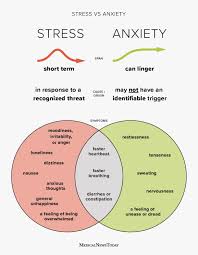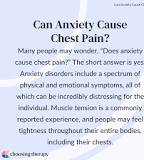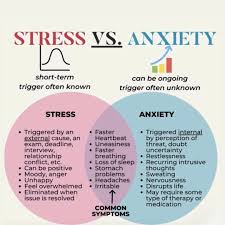Symptoms of Anxiety and Depression
Anxiety and depression are common mental health disorders that can have a significant impact on a person’s well-being. While these conditions are distinct, they often coexist and share some similar symptoms. It’s important to recognize the signs of anxiety and depression to seek appropriate help and support.
Anxiety Symptoms:
- Excessive worry or fear
- Feeling restless or on edge
- Difficulty concentrating
- Irritability
- Muscle tension
- Panic attacks
- Sleep disturbances
- Physical symptoms such as rapid heartbeat, sweating, or trembling
Depression Symptoms:
- Persistent sadness or emptiness
- Lack of interest in activities once enjoyed
- Feelings of hopelessness or worthlessness
- Fatigue or low energy levels
- Changes in appetite or weight
- Sleep disturbances (insomnia or oversleeping)
- Difficulty concentrating or making decisions
- Thoughts of death or suicide
If you are experiencing any of these symptoms on a regular basis and they are affecting your daily life, it’s essential to reach out for help. Mental health professionals can provide effective treatments such as therapy, medication, lifestyle changes, and support groups to manage anxiety and depression.
Remember that seeking help is a sign of strength, not weakness. You deserve to feel better and live a fulfilling life free from the burden of anxiety and depression.
9 Key Symptoms of Anxiety and Depression You Should Know
- Persistent sadness or low mood can be a sign of depression.
- Excessive worry and fear are common symptoms of anxiety.
- Loss of interest in activities once enjoyed often indicates depression.
- Difficulty concentrating is a symptom shared by both anxiety and depression.
- Fatigue or lack of energy can be associated with both conditions.
- Irritability may occur in those experiencing anxiety or depression.
- Sleep disturbances, such as insomnia or oversleeping, are common symptoms.
- Physical symptoms like headaches or stomachaches can accompany anxiety and depression.
- Changes in appetite, either increased or decreased, may signal these mental health issues.
Persistent sadness or low mood can be a sign of depression.
Persistent sadness or a consistently low mood can be a significant indicator of depression. When feelings of sadness linger for an extended period and start to interfere with daily life, it may be a sign that professional help is needed. Depression is a serious mental health condition that requires attention and support to manage effectively. It’s crucial to recognize these symptoms early on and seek appropriate assistance to address the underlying causes and improve overall well-being.
Excessive worry and fear are common symptoms of anxiety.
Excessive worry and fear are hallmark symptoms of anxiety, often manifesting as persistent and overwhelming feelings of unease or apprehension. Individuals experiencing anxiety may find themselves constantly anticipating potential threats or catastrophes, even in situations where there is no immediate danger present. This heightened state of worry can significantly impact daily functioning and quality of life, making it crucial to recognize these symptoms and seek appropriate support and treatment.
Loss of interest in activities once enjoyed often indicates depression.
Loss of interest in activities once enjoyed is a common symptom of depression. When someone who used to find joy and pleasure in hobbies, socializing, or other activities suddenly loses interest and no longer feels motivated to engage in them, it can be a sign of underlying depression. This lack of enthusiasm or enjoyment can significantly impact a person’s quality of life and overall well-being. It’s important to recognize this symptom and seek help from mental health professionals to address the root causes of depression and regain a sense of fulfillment and happiness in life.
Difficulty concentrating is a symptom shared by both anxiety and depression.
Difficulty concentrating is a common symptom shared by both anxiety and depression. When experiencing heightened levels of anxiety, individuals may find it challenging to focus on tasks due to racing thoughts and constant worry. Similarly, individuals dealing with depression may struggle with concentration as a result of persistent feelings of sadness and low energy levels. This difficulty in focusing can impact daily functioning and productivity, highlighting the importance of seeking support and appropriate treatment for these mental health conditions.
Fatigue or lack of energy can be associated with both conditions.
Fatigue or lack of energy can be a common symptom associated with both anxiety and depression. In individuals experiencing anxiety, the constant worry and heightened state of alertness can be mentally and physically draining, leading to feelings of fatigue. Similarly, those struggling with depression may feel a profound sense of exhaustion, making even simple daily tasks seem overwhelming. Recognizing and addressing this shared symptom is crucial in seeking appropriate support and treatment for these mental health conditions.
Irritability may occur in those experiencing anxiety or depression.
Irritability is a common symptom that may manifest in individuals experiencing anxiety or depression. Feelings of irritability can be overwhelming and may lead to outbursts of anger or frustration. It is important to recognize irritability as a potential sign of underlying mental health issues and seek support from professionals who can provide guidance and effective treatment strategies. Addressing irritability as part of a comprehensive approach to managing anxiety and depression can help improve overall well-being and quality of life.
Sleep disturbances, such as insomnia or oversleeping, are common symptoms.
Sleep disturbances, including insomnia or oversleeping, are prevalent symptoms associated with anxiety and depression. Individuals experiencing these mental health conditions may find it challenging to maintain a regular sleep schedule, leading to difficulties falling asleep, staying asleep, or feeling excessively tired despite long hours of rest. These disruptions in sleep patterns can exacerbate feelings of anxiety and sadness, creating a cycle that impacts overall well-being. Seeking professional help and implementing healthy sleep habits are crucial steps in managing these symptoms and improving mental health outcomes.
Physical symptoms like headaches or stomachaches can accompany anxiety and depression.
Physical symptoms such as headaches or stomachaches can often accompany anxiety and depression. These physical manifestations are the body’s way of expressing the psychological distress experienced with these mental health conditions. It’s important to recognize that addressing both the physical and emotional aspects of anxiety and depression is crucial for comprehensive treatment and overall well-being. Seeking professional help to manage these symptoms can lead to improved mental health and a better quality of life.
Changes in appetite, either increased or decreased, may signal these mental health issues.
Changes in appetite, whether it’s an increase or decrease in food intake, can be a significant indicator of underlying mental health issues such as anxiety and depression. Some individuals may experience a loss of appetite due to feelings of sadness or hopelessness, leading to unintended weight loss and nutritional deficiencies. On the other hand, others may turn to food for comfort during times of stress or anxiety, resulting in overeating and potential weight gain. Monitoring changes in appetite can provide valuable insights into one’s emotional well-being and serve as an early warning sign to seek professional help and support.




